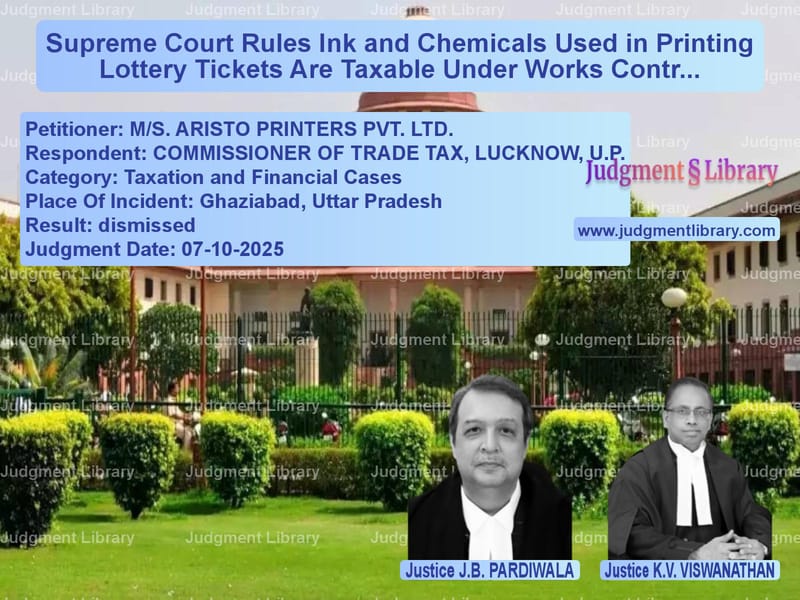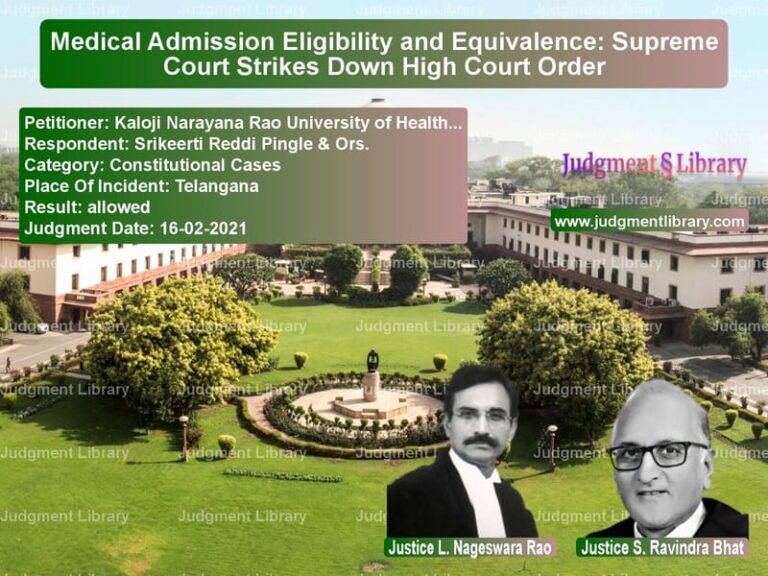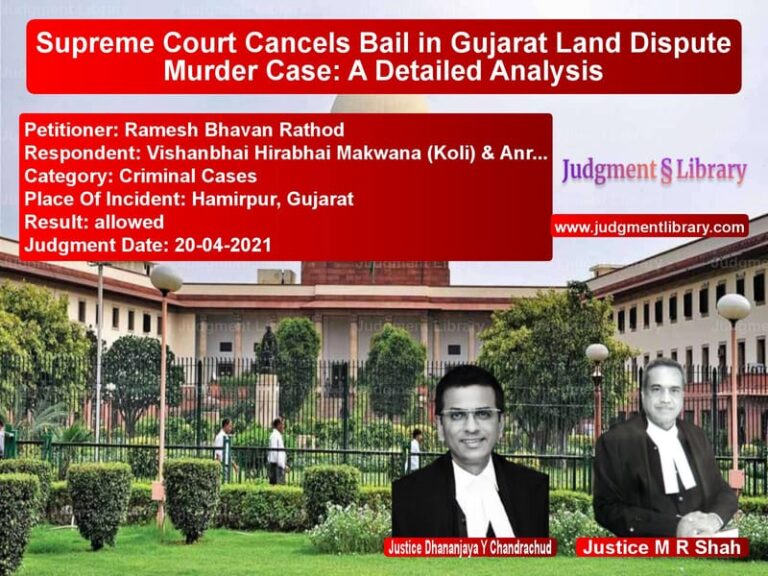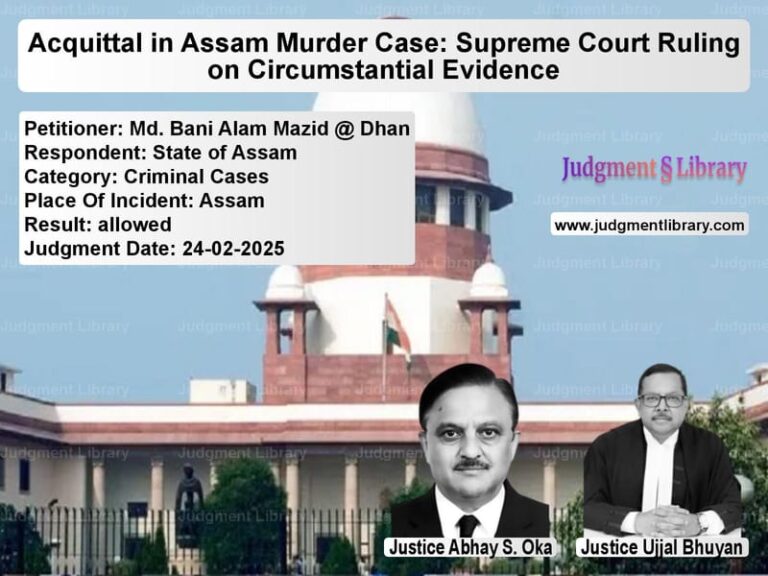Supreme Court Rules Ink and Chemicals Used in Printing Lottery Tickets Are Taxable Under Works Contract
In a significant ruling that clarifies the taxation of materials used in works contracts, the Supreme Court of India has delivered a judgment that will impact printers and other service providers across the country. The case involved M/s. Aristo Printers Pvt. Ltd., a company engaged in printing lottery tickets, and the Commissioner of Trade Tax from Lucknow, Uttar Pradesh.
The dispute centered around whether ink and processing materials used in printing lottery tickets should be subject to trade tax under Section 3F of the Uttar Pradesh Trade Tax Act, 1948. The journey of this case through various levels of the tax administration and judiciary reveals the complexities of interpreting tax laws in relation to works contracts.
The story begins with the Assessing Authority, the Trade Tax Officer in Ghaziabad, who levied trade tax on the value of ink, processing material, and packing material used by Aristo Printers for executing printing work. This decision was made for the assessment years 1996-1997 and 1997-1998. The printer, believing this assessment to be incorrect, appealed to the Deputy Commissioner (Appeals)-II, Trade Tax in Ghaziabad.
The Appellate Authority delivered a mixed verdict. It accepted Aristo’s argument regarding ink and processing materials, stating in its order: “Goods on the sale of which tax has been levied on the trader which includes processing material, chemicals, film founta etc. and which is not transferred to the principal after getting job-work/work contract undertaken done under any circumstances. These material are film, chemical print etc and these are used for preparing plate for screen printing and after the use, either it becomes a waste or its nature gets changed, but it is not transferred to principal who get job-work/work contact done under any of the circumstances.” However, the Authority upheld the tax on packing materials.
Both parties were partially dissatisfied with this outcome. The Commissioner of Trade Tax appealed against the deletion of tax on ink and processing material, while Aristo Printers challenged the levy on packaging material. The Trade Tax Tribunal in Ghaziabad ruled in favor of the printer on both counts, setting aside the tax on packaging material and affirming the deletion of tax on ink and processing materials.
The Revenue Department then approached the High Court through revision applications. The High Court took a different view from the Tribunal, allowing the Revenue’s revisions and restoring the assessing authority’s order that had levied tax on ink and processing materials. The High Court observed: “In my view the order of the Tribunal is not sustainable. Section 3-F of the Act levies tax on the value of goods involved in execution of works contract. The printing work has been held to be works contract by the Apex Court… Undoubtedly, ink passed on to the customers as it is apparent on the printing paper. The inks are diluted in chemicals (processing material) and such ink in the diluted forms are being used in the printing, therefore, both ink and chemical (processing material) are passed on to the customers.”
This led Aristo Printers to approach the Supreme Court, setting the stage for the final determination of this legal issue.
Arguments Presented Before the Supreme Court
Before the Supreme Court, Mr. Niraj Kumar, representing Aristo Printers, made several key arguments. He contended that the High Court had fundamentally misunderstood the nature of lottery tickets, erroneously treating them as “goods” when they are actually “actionable claims” explicitly excluded from the definition of “goods” under the Act. He further argued that “the ink and chemicals used in the printing process were essentially consumables whose property is never transferred to the customer. These materials are entirely used up and consumed during the execution of the printing job. Since the customer does not receive the ink or chemicals in any form, but only the service of printing, these items should not be treated as goods that are transferred in execution of the works contract.”
On the other side, Mr. Bhakti Vardhan Singh, representing the State, defended the High Court’s judgment. He relied on precedents including Commissioner of Sales Tax v. Matushree Textile Limited and Commissioner of Sales Tax, Mumbai v. Hari and Company, arguing that “in the facts at hand, it is evident that ink and chemicals have been transferred to the customer and thereby are liable to the levy of tax under Section 3F(1)(b) of the Act, 1948.”
The Legal Framework and Constitutional Background
The Supreme Court began its analysis by examining the relevant legal provisions and the historical context of works contract taxation. The Court noted that before the Constitution (Forty-sixth Amendment) Act, 1982, works contracts were considered indivisible, and states could not levy sales tax on materials used in such contracts as there was no distinct “sale” of goods.
The Forty-sixth Amendment changed this landscape by introducing Article 366(29-A), which expanded the definition of “tax on the sale or purchase of goods” to include “a tax on the transfer of property in goods (whether as goods or in some other form) involved in the execution of a works contract.” This constitutional amendment allowed states to bifurcate works contracts into two parts: one for the sale of goods and another for supply of labor and services.
The Court emphasized that “the power to levy tax under Article 366(29A)(b) did not vest in the States the power to tax works contracts themselves, nor did it allow the States to levy taxation dehors the restrictions imposed under Article 286 of the Constitution.”
Examining the Transfer of Property in Goods
The core issue before the Court was whether there had been a transfer of property in the ink and processing materials used for printing lottery tickets. The Court identified three conditions required to sustain a levy of tax under Section 3F(1)(b): (i) there must be a works contract; (ii) the goods should have been involved in the execution of the works contract; and (iii) the property in those goods must be transferred to a third party either as goods or in some other form.
In the present case, the first two conditions were not in dispute. The appellant had admitted that printing lottery tickets constituted a works contract, and it was clear that ink, chemicals, and other processing materials were involved in the printing process.
The disagreement centered on the third condition—whether there was a transfer of property in these goods. The appellant argued that the ink and chemicals were consumed during printing and thus no transfer occurred. The Revenue contended that these materials were transferred to the customer during the execution of the works contract.
The Court examined numerous precedents dealing with similar questions, categorizing them into three groups: cases involving tangible transfer of property, cases where courts found no transfer due to consumption of goods, and cases where transfer was found despite consumption.
The Court made a crucial distinction in its analysis: “The emphasis of the courts on ‘consumption’ in the aforesaid cases is incorrect… The focal point of analysis by the courts should have been not whether the goods have been consumed, but rather whether the transfer of property has occurred.”
The Court’s Reasoning and Final Decision
The Supreme Court firmly rejected the approach taken in cases like Pest Control India Ltd v. Union of India and others, where courts had focused on whether goods continued to exist after consumption. Instead, the Court aligned itself with the reasoning in Xerox Modicorp Ltd v. State of Karnataka and Enviro Chemicals v. State of Kerala, which identified the taxable event as the precise moment when the contractor’s goods are incorporated into the ‘works.’
The Court explained: “The taxable event, or the ‘deemed sale’, occurs at the precise moment the ink is applied to the paper. This act constitutes ‘incorporation in the works’, as the ink and the chemicals (with which the ink is mixed) are involved in the execution of the work contract and become a part of the lottery ticket. In this process, there is a tangible transfer of the diluted ink, a composite good comprising both the ink and the processing chemicals.”
The Court further noted that “the items need not exist in any form in the resultant product. To insist that a transfer of property is contingent upon the good’s tangible presence in a final product is to impose a condition that Article 366(29A)(b) does not contemplate and, in fact, is textually contradictory.”
Applying these principles to the case at hand, the Court concluded: “We have no doubt in our mind that there is a transfer of property in the ink and chemicals used in the printing of the lottery tickets… Since it is impossible to transfer the ink without also transferring the chemicals it is diluted with, it can be conclusively inferred that the property in both the ink and the chemicals has been transferred.”
Conclusion and Impact
The Supreme Court dismissed Aristo Printers’ appeals, upholding the levy of trade tax on ink and processing materials used in printing lottery tickets. The Court found that all three conditions for taxation under Section 3F(1)(b) were satisfied: there was a works contract for printing lottery tickets; ink and chemicals were involved in executing this contract; and the property in these goods was transferred during the execution of the works contract.
This judgment provides important clarity on the taxation of materials used in works contracts, particularly those that are consumed or transformed during the process. The Court’s emphasis on the moment of incorporation rather than the continued existence of the goods establishes a clear principle for future cases. The ruling reinforces the expanded scope of sales taxation following the Forty-sixth Amendment and serves as a significant precedent for similar disputes involving works contracts across various industries.
The decision underscores that the key question in such cases is not whether goods are consumed, but whether transfer of property occurs during the execution of the works contract. This clarification will guide businesses and tax authorities alike in determining tax liability for materials used in service-based contracts where physical goods are transformed or consumed in the process of delivering the final product or service.
Petitioner Name: M/S. ARISTO PRINTERS PVT. LTD..Respondent Name: COMMISSIONER OF TRADE TAX, LUCKNOW, U.P..Judgment By: Justice J.B. PARDIWALA, Justice K.V. VISWANATHAN.Place Of Incident: Ghaziabad, Uttar Pradesh.Judgment Date: 07-10-2025.Result: dismissed.
Don’t miss out on the full details! Download the complete judgment in PDF format below and gain valuable insights instantly!
Download Judgment: ms.-aristo-printers-vs-commissioner-of-trad-supreme-court-of-india-judgment-dated-07-10-2025.pdf
Directly Download Judgment: Directly download this Judgment
See all petitions in Income Tax Disputes
See all petitions in GST Law
See all petitions in Tax Evasion Cases
See all petitions in Tax Refund Disputes
See all petitions in Customs and Excise
See all petitions in Judgment by J.B. Pardiwala
See all petitions in Judgment by K.V. Viswanathan
See all petitions in dismissed
See all petitions in supreme court of India judgments October 2025
See all petitions in 2025 judgments
See all posts in Taxation and Financial Cases Category
See all allowed petitions in Taxation and Financial Cases Category
See all Dismissed petitions in Taxation and Financial Cases Category
See all partially allowed petitions in Taxation and Financial Cases Category







